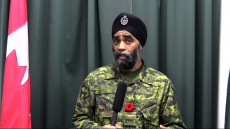OTTAWA — Canada's border agency plans to compare images of people arriving in the country with photographs of suspects on watchlists to keep out alleged terrorists and other criminals.
The federal privacy watchdog has cautioned the agency that the scheme could ensnare the wrong travellers, resulting in unwarranted scrutiny for some people at the border.
The Canada Border Services Agency wants to see how well the facial-recognition technology works at various locations and under specific lighting and crowd-movement conditions.
The border agency's science and engineering directorate has quietly been working with the University of Quebec and other partners to gauge the ability of devices to extract needed information from video footage.
The initiative is among the latest federal efforts to use biometric tools that focus on personal characteristics — such as fingerprints, an iris or the contours of one's face — to identify people in the name of security.
In his recently released annual report, privacy commissioner Daniel Therrien says his office provided advice on the potential pitfalls, including the possibility of "false positives" that could result in unnecessary secondary screening for travellers.
The office also urged the border agency to assess the risks of using such technology, including issues that might arise during testing phases.
The border agency declined to make anyone available to discuss the project. In written answers, the agency said it continues to work with the commissioner to "ensure that privacy implications are appropriately addressed."
The agency also noted that while it plans to test the technology in an "operational context," no trials involving actual travellers have yet taken place.

The surveillance tool could eventually be in place at border points and international airports across Canada.
According to the commissioner's office, for facial recognition to be successful there needs to be a quality digital image of an individual’s face, a database of images of identified individuals and facial-recognition software that will accurately find a match between the two.
Technical findings published by the federal border agency indicate researchers have assessed the technique's use in settings such as an interview counter, hallway, turnstile, and waiting and baggage-claim areas.
One thread of the research looked at a system's ability to match images of people in a video stream with photos of "persons of interest."
The Calgary police service is said to be the first force in Canada to use the technology for solving crimes.
Passport Canada has been using facial recognition for years to scrutinize photos and prevent the same person from holding multiple passports under different names. The privacy commissioner has made several recommendations about the initiative, saying all of the data in the system should be protected through encryption.
"We are not yet at the point where we can take pictures of people on the street with our smartphones, identify them, and gain access to information about them," said a March 2013 report published by the commissioner's office.
"However, this reality may not be too far off and we can only imagine what that will do to our interactions, relationships, and how we conduct our lives."



